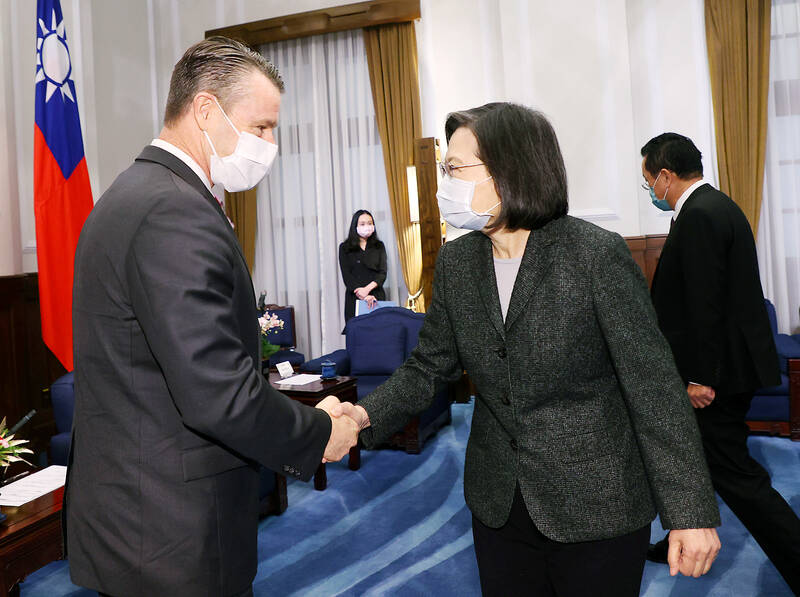A US senator who sponsored the Creating Helpful Incentives to Produce Semiconductors (CHIPS) and Science Act yesterday said that he planned to learn more about Taiwan’s semiconductor industry and promote closer links between the countries during his three-day trip to Taiwan.
US Senator Todd Young said during his meeting with President Tsai Ing-wen (蔡英文) that his visit from Monday to today had several purposes, including to show the US Congress’ bipartisan support for Taiwan.
Young said that as one of the sponsors of the CHIPS act, which US President Joe Biden signed into law last year to boost domestic research and manufacturing of semiconductors and counter China, he wanted to learn more about Taiwan’s semiconductor industry.

Photo: CNA
“I am here to learn how to continue do that [chip cooperation], sell more chips, and hire more people and [promote] more linkages between the US and Taiwan and other countries moving forward. That will benefit all of us,” he said.
Todd also said that his home state of Indiana had maintained a close friendship with Taiwan for decades. Its capital, Indianapolis, established a sister-city relationship with Taipei in 1978 before the state formed a “sisterhood” with Taiwan in 1979.
Indiana was the first US state to forge a sister relationship with Taiwan.
Recently, Indiana and Taiwan have signed agreements to promote academic research in semiconductors, he added.
The Republican senator said that while Americans have different views on a lot of issues, there was bipartisan support for Taiwan.
“Make no mistake, there is something Republicans and Democrats alike are unified on and will be unified. That is the importance of supporting the US-Taiwan relationship and holding the Chinese Communist Party accountable,” he said, without clarifying his remark about China.
Tsai welcomed the visit by Young, who is the first US senator to travel to the country in the new US congressional session.
She praised him for being one of Taiwan’s strongest supporters in the US Congress by backing Taiwan’s international participation and being a key architect of the CHIPS act.
“Facing authoritarian expansion and post-COVID-19-pandemic economic challenges, like-minded partners need to build a sustainable supply chain for democracy chips. This will help Taiwanese, the US and global economies continue to prosper and develop,” she said.
Tsai also called on Young to advocate for the possible signing of a Taiwan-US agreement on double taxation to create more opportunities for companies from both sides to engage in exchanges.
Young arrived late on Monday as part of a larger trip to the Indo-Pacific region.
During his stay, he was to meet with senior leaders and private-sector representatives to discuss US-Taiwan relations, regional security, trade and investment, global supply chains and other significant issues of mutual interest, the American Institute in Taiwan said.

A strong continental cold air mass is to bring pollutants to Taiwan from tomorrow, the Ministry of Environment said today, as it issued an “orange” air quality alert for most of the country. All of Taiwan except for Hualien and Taitung counties is to be under an “orange” air quality alert tomorrow, indicating air quality that is unhealthy for sensitive groups. In China, areas from Shandong to Shanghai have been enveloped in haze since Saturday, the ministry said in a news release. Yesterday, hourly concentrations of PM2.5 in these areas ranged from 65 to 160 micrograms per cubic meter (mg/m³), and pollutants were

Taiwan’s armed forces have established response protocols for a wide range of sudden contingencies, including the “Wan Chun Plan” to protect the head of state, the Ministry of Defense (MND) said today. After US President Donald Trump on Saturday launched a series of airstrikes in Venezuela and kidnapped Venezuelan President Nicolas Maduro, concerns have been raised as to whether China would launch a similar “decapitation strike” on Taiwan. The armed forces regularly coordinate with relevant agencies and practice drills to ensure preparedness for a wide range of scenarios, Vice Minister of National Defense Hsu Szu-chien (徐斯儉) told reporters before a

EVA Airways on Saturday said that it had suspended a pilot and opened an investigation after he allegedly lost his temper and punched the first officer several times as their plane was taxiing before takeoff at Los Angeles International Airport. According to a report published on Thursday by The Reporter, the incident occurred after the flight’s Malaysian first officer tried to warn the Taiwanese pilot, surnamed Wen (文), that he was taxiing faster than the speed limit of 30 knots (55.6kph). After alerting the pilot several times without response, the first officer manually applied the brakes in accordance with standard operating

Japanese Councilor Hei Seki (石平) on Wednesday said that he plans to visit Taiwan, saying that would “prove that Taiwan is an independent country and does not belong to China.” Seki, a member of the Japan Innovation Party, was born in Chengdu in China’s Sichuan Province and became a naturalized Japanese in 2007. He was elected to the House of Concilors last year. His views on the Chinese Communist Party (CCP) — espoused in a series of books on politics and history — prompted Beijing to sanction him, including barring Seki from traveling to China. Seki wrote on X that he intends